Temple in Jerusalem
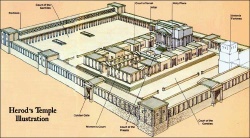
Temple in Jerusalem
Temples and Tabernacles
Temples originally were areas where certain activities of society were conducted. Were these just superstitions or was there a practical plan laced within the rituals and rites of these institutions of mankind?
The purpose of the performance of "sacred" duties was to help keep society healthy and whole and protected by unseen spiritual realms which we might think of as ethereal or quantum in nature.
The methods by which different societies were drawn to the temple area varied greatly as did the functions pursued there. What was allowed in one temple was prohibited in another. But they were all designed to provide society with forms of protection that safeguarded the people as a nation.

Israel was a nation of individuals where every man and his family could gather and serve the purposes of God as true children of God.

The rites and rituals, the white stones and gold trimmings were distractions from the real purpose of the temple.

There was no Golden calf. It was not originally like the Temple of Diana. There were Altars for Sacrifice within the temple as well as sacrifices like that of the Red Heifer which took place outside the temple. These were not merely religious rituals. This was Pure Religion.

The original temple was not made of stone but was a tent where people came and gathered.
If the temple of God is truly made of living stones what should it look like and why?
While the Temple of Herod in Jerusalem was fashioned after the ancient pattern in the wilderness, the Pharisees and Herod had unmoored the symbols of the Testament until their temple was an abomination and their Corban made the word of God to none effect. They had strayed so much from the purposes of Pure Religion that they did not know Christ nor would they have known Moses.
They thought they were believers. They thought they were the children of God. They called themselves the chosen of God. But like many Modern Christians they practiced False religion for so long that they eventually ended up doing the opposite of what Moses really taught. As a result they did not recognize the Messiah when he came. Some even chose to kill Jesus. They had become anti-Christ and part and parcel to the Christian conflict.
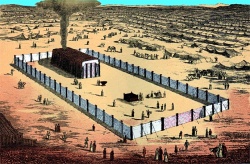
The temple in the wilderness was a tabernacle or tent. Around the temple every man had his own tent in congregation with all other congregations in a network of Free Assemblies connected through a network of Ministers who received the Freewill offerings of the people, for the people, and by the people in the service of God the Father who was in heaven, a spiritual realm. The bonds of that society and its communion were based upon Love not force. Love is the essence of charity and requires Forgiveness.
Kings and Courts
- How did Israel actually work as a government?
- What service did the temple provide society that would bind it together?
- What was the work of the ministers, Levites and Priests really all about?
- Were they spiritual gurus that tickled the ears in sermons on the Sabbath?
- How did the people organize themselves since there was no other government to do so?
- How did the stone temples reflect the ancient ways?
- Can we find messages about the Living Temple of Christ's appointment in the ancient design?
Temples from ancient times involved an area, not merely a building. Men like Solomon chose to build structures and some of the designs incorporated some of the principles of the purpose of temple areas. If we look at the structures we may find hints into spiritual laws of the universe in which we live that may help us understand what and how the kingdom of God works to free mankind and keep him free. The temple had many aspects, parts, structures and areas. This was called the "temple complex".
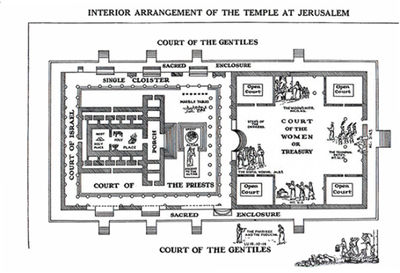
- The Court of the Gentiles
- The Sacred Enclosure
- The Outer Court included
- The Court of the Women
- The Court of the Treasury
- The Chamber of wine and oil
- The chamber of the Nazarite
- The Chamber of the Lepers
- The Chamber of wood
- The Court of Israel.
- The Court of the Priests
- The Porch
- The Vestibule
- The Holy Place
- The Most Holy Place.
Many more things could be considered as parts of this elaborate complex. But was the temple ever suppose to be made of dead stones? Are they symbols pointing to spiritual truths? How do these structures fit into the structure of the temple of the Holy Spirit in each of us and also in the Body of Christ and the Kingdom of God appointed to the Apostles by Christ which is to be a living temple made of lively stones?
The truth is we can only understand if we let God write upon our hearts and upon our minds. These are things that we can learn by doing the service God and Christ called us to do, both as Ministers and Elders of his Community.
For each family to become free and stay free, each family must conform to the pattern we see in Christ. Not by their own will but by accepting the will of the Father. By fasting from pride and selfishness. By sacrificing and serving as Christ came to do.
Ministers are to aid in this process, not merely on a congregational level, but on a kingdom level.
Just as we are to love our neighbor as our selves in the Body of Christ and the network of ministers, so also must we care about other congregations throughout the whole body or community of Christ as much as we care about the people closest to us.
The Ministers of Christ are the Servants of His Kingdom. A minister is NOT the servant of the congregation he may serve. He is not just a minister of mere charity but of Fervent Charity.
"Follow me!" —Jesus the Christ.
- One of the most important things to do is to become involved in a network of Charitable Practices. Everyone should want to join a Living Network of Love and Charity.
- If you think you have a calling to be a Minister of God or you might want to dedicate your life to Christ as an Ordained Minister of His Holy Church, contact us to start the process of discipleship and become the benefactors who exercise only love, NOT authority.[1]
Ancient Patterns
There were no kings in Israel[2] but everyone was king in his own tent.
This is a good thing if the people will be bound together by faith in God and His way of love and Pure Religion through Charitable Practices of love for one another. The election of a ruler who could exercise authority one over the other was called a rejection of God in 1 Samuel 8. It was forbidden by Christ for His followers to call men Father in word or deed. Or pray to them as Benefactors.
The court systems of ancient Israel are not clearly described in the Old Testament or even in apocryphal source. But there clearly was an entire system by which to decide judicial matters of law and guilt and innocence.
Studying that society itself, its language and customs begins to reveal what was required to maintain the ancient Israelite Republic.
The Levites regularly served as court officers. While Levites were considered to be a separate people or tribe they depended upon the people to establish their limited authority. We can see this when we understand why they supposedly made the Levites Underwear.
The laws or customs governing the conduct of judges and witnesses was essential for the appointment of assistant judges (Exodus 18) and is clear that there was a need for judicial reform in the days of Jehoshaphat(2 Chronicles 19).
The Elders of a family had the imperium and potestas authority to decide cases within his household without bringing the matter before a Levite judge or even a jury of his peers (Genesis 31; Genesis 38).
When more than one family was involved a legal matter or disputes could be settled through the the convening of local congregations of society in which they arose.[3]
It was essential that every Elder attend to the Weightier matters to preserve justice. The whole community, to preserve unity, essential for survival, would need to perceive the outcome as just.
Occasionally several tribes were involved which led to trial by combat (Judges 19-21 ). But when they thought a king would prevent such conflict they were wrong for kings brought not only conflict but division, corruption and captivity.
The book of Judges suggest special judicial authority was possessed by some individuals appointed by God but that appointment was the result of many individuals voluntarily supporting that appointment. Acceptance of Judicial power remained grass roots and was maintained through that original Network of Freewill offerings of support or charity.
A hierarchical system of courts and judges came about when they rejected God's reign in the hearts and minds of individuals and political authority was centralized.
The king had limited judicial authority and even their political power was limited and did not have the authority to enact laws or do anything that might return the people to the Bondage of Egypt( Deuteronomy 17). Kings could fire priests and judges but they were to be elected through the people in a network of Free Assemblies.
The network of charitable priesthood showed a presence in the judicial authority of the networking community of Elders. The high court in the Temple in Jerusalem suggests a role for priests with what might be called a secular judge (Deuteronomy 17:9; Deuteronomy 19:17; 2 Chronicles 19:8-11 ).
It was not an elite Priesthood which ruled on matters pertaining to the community but the mercy of a body of men in charge of charity and welfare that tempered judgment and mercy. Since the whole society was immersed in the Weightier matters of justice, mercy and law accuser and accused argued their own cases.
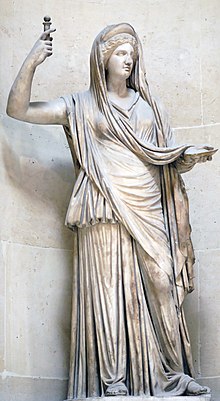
Temple of Venus and Roma
The Temple of Venus and Roma — in Latin, Templum Veneris et Romae — is thought to have been the largest temple in Ancient Rome. But also Herod the Great erected a temple of Roma in the region of Caesarea Philippi to the emperor Augustus and had already built temples to the Emperor at Caesarea Maritima and at Sebaste.
- “Herod’s strategy in erecting this temple extended far beyond the symbolism represented by the structure itself. He was among the first of all provincial rulers in the empire to commit to the cult of Augustus. His Augustan temples, and the elaborate priesthood they required, may even have been influential in setting the course of imperial worship throughout the Eastern empire. While ostensibly the act of erecting these temples represented loyalty and commitment to Rome, it also furnished a basis for the social and political organization of diverse populations such as those in Herod’s kingdom. At the same time, because the new cult left the traditional local cults intact, it represented no threat to them. In fact, it symbolized an interest in protecting the local culture.” [4]
What was the "cult of Augustus"?
It was the Imperial Cult of Rome which as a "social and political organization" included a membership through a social welfare scheme of Corban like that used by Herod and the Pharisees.
Roma in Rome
The Temple of Venus and Roma had two adjoining chambers or cellae, which contained a statue. statue.
Venus Felix was the ancient representation of the Roman people, while Roma Aeterna represented the genius of the city. Together they represented a supposedly symmetrical arrangement of the civil government and the people. The two deities evoked, Roma and Amor.
In Rome they were situated on the slope of the Velia Hill, with the Arch of Titus at one corner and the Via Sacra passing down its side with Hadrian's temple also apart of the Forum of temples and the Colosseum was faced by Venus.
After Constantine established his church the temple was stripped in AD 382 by Gratian and by AD 391 Theodosius made a series of decrees prohibiting pagan worship. Eventually a Church of Santa Francesca Romana was erected there.
Roma in Judea
Herod the Great built many buildings which provided services to people as well as being a memorial to his success as a ruler of the people. Augustus continued the civil philanthropy of Julius Caesar had begun funding through his war on the Gauls. Julius as commander in chief of his army had stripped of the wealth of the Gauls and sold hundreds of thousands of people into slavery. Instead of being tried for war crimes he appeased the people by showering them with "gifts, gratuities, and benefits".[5]
part of a plan to show his indebtedness to his benefactor Herod the Great (37–4 B.C.) built a very large temple in Caesarea Maritima dedicate to the "goddess Roma, the embodiment of imperial Rome, and to the god–king Augustus" (Holum: 45).
Although the temple does not survive, it is known from the descriptions of the Jewish historian Josephus and the excavations carried on at the site (see reference below).
From the outset, it should be remembered that Caesarea Maritima was predominantly a Gentile city—thus the "pagan" temple, but Herod also rebuilt the Temple to the God of Israel, and expanded its platform. These two building projects of Herod do indeed say something about his character and outlook on life!
Some of the above, and following, information was gleaned from Holum, Kenneth G. "Building Power — The Politics of Architecture." Biblical Archaeology Review, vol. 30, no. 5 (September/October, 2004):36–45, 57.
King Herod's Temple of Roma and Augustus at Caesarea Maritima was a similar structure but understanding the purpose of these buildings which represented a combination of civil authority and the sacrifices of the people to establish a system of Legal charity is critical to understanding their function and how they opposed the teachings of Christ.
Augustus would bestow gifts on the Greek people and build a Temple of Roma on the Acropolis aligned with the Parthenon of Athens in 19 AD. This granting of gifts, gratuities and benefits was not just to convince the people of his unbiased benefaction but create a dependence and loyalty among the masses. Herod did the same in Judea. [6]
The temple was a symbol of a divine office of Rome and Caesar as the head of the Imperial Cult of Rome which was the center of the Public religion of the Empire and its social welfare State.
These buildings were monuments to their propaganda which caused the people to hail the once humble Octavius as the now divine "Augusts Soter"[7] meaning “savior of the world”.
And of course since both the Caesars and Jesus the Christ would be called the Son of God these titles would contribute to the Christian conflict. This is why the two of them were often seen as or referred to by some as the Eagle and Dove because of the manner and methods used by them and their followers to provide for the social welfare of the people. The former like Herod and the Pharisees depended upon public Religion while the latter and His Church depended upon Pure Religion.
Temple Services
All Temples provided a service to societies which was cloaked in what was called Religion although the definition of religion has varied greatly over the years. Originally religion had more to do with the welfare of society more than what you thought about a divine creator.
Pure Religion was the result of charity through the Perfect law of liberty while Public religion as most nations practiced in their government Temples was steeped in Covetous Practices that made them Merchandise and cursed their children with debt through men who called themselves Benefactors who exercised authority.
Service of society was how society distributed benefits to its members and neighbors.
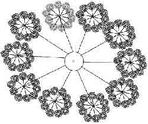
Christians were learning to attend to the Weightier matters of the law, judgment, mercy, and faith which include caring for the needs of our neighbors and the widows and orphans of our society through Pure Religion in matters of health, education, and welfare. We are NOT to provide for the needy of society through the Covetous Practices and the men who call themselves benefactors but who exercise authority one over the other like the socialists do.
The Way of Christ was like neither the way of the world of Rome nor the governments of the gentiles who depend on those fathers of the earth through force, fear and fealty who deliver the people back in bondage again like they were in Egypt. Christ's ministers and true Christians do not depend upon systems of social welfare that force the contributions of the people like the corban of the Pharisees which made the word of God to none effect. Many people have been deceived to go the way of Balaam and the Nicolaitan and out of The Way of Christ and have become workers of iniquity.
The Christian conflict with Rome in the first century Church appointed by Christ was because they would not apply to the fathers of the earth for their free bread but instead relied upon a voluntary network providing a daily ministration to the needy of society through Faith, Hope, and Charity by way of freewill offerings of the people, for the people, and by the people through the perfect law of liberty in Free Assemblies according to the ancient pattern of Tuns or Tens as He commanded.
The modern Christians are in need of repentance.
"Follow me!" —Jesus the Christ.
- One of the most important things to do is to become involved in a network of Charitable Practices. Everyone should want to join a Living Network of Love and Charity.
- If you think you have a calling to be a Minister of God or you might want to dedicate your life to Christ as an Ordained Minister of His Holy Church, contact us to start the process of discipleship and become the benefactors who exercise only love, NOT authority.[8]

Religion |
Pure Religion |
Private welfare |
Fleeing Religion |
False religion |
Public religion |
Our Religion |
Christian conflict |
Corban |
Baptism |
Benefactors |
That Word |
Daily ministration |
Modern Christians |
Diocletianic Persecution |
Christians check list |
gods |
Judge not |
Judge |
Fathers |
Deist |
Damnable heresies |
Factions at the altar |
Pharisees |
Sadducees |
Zealot |
Essenes |
Levites |
Messianic Judaism |
Menahem the Essene |
Sanhedrin |
Altars |
Clay and Stone |
Red Heifer |
Golden calf |
Freewill offerings |
Religion |
Pure Religion |
Public religion |
Christian conflict |
Paganism |
Denominations |
Dispensationalism |
Benefactors |
Corban |
Daily ministration |
Calendars |
Cult |
Imperial Cult of Rome |
Guru theories| |
Covet |
Merchandise |
Mark of God |
Mark of Cain |
Mark of the Beast |
Nature of the Beast
Section 666 |
Benefactors |
Biting one another |
Cry out |
Worship |
Church |
Temples |
Religious Orders |
Priests |
Kings and priests |
Hear |
Bible Index |
Network |
CORE |
Free Assemblies |
Congregations |
Congregants |
Elders |
Fractal Network
Why Congregate |
Why we gather |
Why Minister |
Church |
Why Church |
COM |
MORE |
Congregations of Rebuke |
Tips on forming a CORE |
CORE Solution |
CORE Off Track |
First to do List |
Why did Jesus Say |
Society and community |
Feasts |
Celebrate |
Network |
Banking links
Federal Reserve |
Money |
Money Audio |
Real Money |
Money can be anything |
Commodity money |
Mammon |
One purse |
Knife |
Corban |
Altars |
Golden calf |
Reserve fund |
The Bank of the Golden Calf |
Graven images |
Temples Banks and the Brokerage House |
Temples |
Temples and Churches |
The Greatest Reset |
Ephesus |
Temple of Diana |
Temples of Herod |
Federal Reserve |
Bretton Woods Institutions |
Temple in Jerusalem |
Moneychangers |
Seven men |
Tithe |
Treasury |
Surety |
Imperial Cult of Rome |
Babylon |
New Deal |
Section 666 |
Mark of the Beast |
Money Audio |
Real Money |
Money can be anything |
Debt Money |
Money as debt quotes |
Bitcoin |
Cashless |
Money |
I paid in |
Commodity money |
Value |
Mammon |
Covet |
Merchandise |
One purse |
Road Map |
Golden calf |
Temples |
Treasury |
Moneychangers |
The Bank of the Golden Calf | Study audio
Seven men |
Reserve fund |
Ephesus |
Tithe |
Sabbath |
Credit unions |
Thy first love |
HHC Money vs Mammon >
>Audio |
Conversion vs Reconversion >
>Audio |
If you need help:
- Or want to help others:
Join The Living Network of The Companies of Ten
The Living Network |
Join Local group |
About |
Purpose |
Guidelines |
Network Removal
Contact Minister |
Fractal Network |
Audacity of Hope |
Network Links
Footnotes
- ↑ Matthew 20:25-26 But Jesus called them unto him, and said, Ye know that the princes of the Gentiles exercise dominion over them, and they that are great exercise authority upon them. But it shall not be so among you: but whosoever will be great among you, let him be your minister;
Mark 10:42-43 But Jesus called them to him, and saith unto them, Ye know that they which are accounted to rule over the Gentiles exercise lordship over them; and their great ones exercise authority upon them. But so shall it not be among you: but whosoever will be great among you, shall be your minister:
Luke 22:25-26 And he said unto them, The kings of the Gentiles exercise lordship over them; and they that exercise authority upon them are called benefactors. But ye shall not be so: but he that is greatest among you, let him be as the younger; and he that is chief, as he that doth serve. - ↑ Judges 17:6 In those days there was no king in Israel, but every man did that which was right in his own eyes. Judges 18:1 In those days there was no king in Israel: and in those days the tribe of the Danites sought them an inheritance to dwell in; for unto that day all their inheritance had not fallen unto them among the tribes of Israel. Judges 19:1 And it came to pass in those days, when there was no king in Israel, that there was a certain Levite sojourning on the side of mount Ephraim, who took to him a concubine out of Bethlehemjudah. Judges 21:25 In those days there was no king in Israel: every man did that which was right in his own eyes. 1 Kings 22:47 There was then no king in Edom: a deputy was king. 2 Kings 23:25 And like unto him was there no king before him, that turned to the LORD with all his heart, and with all his soul, and with all his might, according to all the law of Moses; neither after him arose there any like him. Nehemiah 13:26 Did not Solomon king of Israel sin by these things? yet among many nations was there no king like him, who was beloved of his God, and God made him king over all Israel: nevertheless even him did outlandish women cause to sin. Psalms 33:16 There is no king saved by the multitude of an host: a mighty man is not delivered by much strength. Proverbs 30:27 The locusts have no king, yet go they forth all of them by bands; Daniel 2:10 The Chaldeans answered before the king, and said, There is not a man upon the earth that can shew the king’s matter: therefore there is no king, lord, nor ruler, that asked such things at any magician, or astrologer, or Chaldean. Hosea 10:3 For now they shall say, We have no king, because we feared not the LORD; what then should a king do to us? Micah 4:9 Now why dost thou cry out aloud? is there no king in thee? is thy counsellor perished? for pangs have taken thee as a woman in travail. John 19:15 But they cried out, Away with him, away with him, crucify him. Pilate saith unto them, Shall I crucify your King? The chief priests answered, We have no king but Caesar.
- ↑ Ruth 3:18 Then said she, Sit still, my daughter, until thou know how the matter will fall: for the man will not be in rest, until he have finished the thing this day. Ruth 4:1 And he took ten men of the elders of the city, and said, Sit ye down here. And they sat down. 3 And he said unto the kinsman, Naomi, that is come again out of the country of Moab, selleth a parcel of land, which was our brother Elimelech’s:
- ↑ Caesarea Philippi: Banias the Lost City of Pan by John Francis Wilson, p. 13.
- ↑ "That the man who first ruined the Roman people twas he who first gave them treats and gratuities" Plutarch's Life of Coriolanus (c. 100 AD.)
- “The real destroyers of the liberties of the people is he who spreads among them bounties, donations, and benefits.” Plutarch
- ↑ "The annual Temple-tribute was allowed to be transported to Jerusalem, and the alienation of these funds by the civil magistrates treated as sacrilege. As the Jews objected to bear arms, or march, on the Sabbath, they were freed from military service. On similar grounds, they were not obliged to appear in courts of law on their holy days. Augustus even ordered that, when the public distribution of corn or of money among the citizens fell on a Sabbath, the Jews were to receive their share on the following day. In a similar spirit the Roman authorities confirmed a decree by which the founder of Antioch, Seleucus I. (Nicator),[d Ob.280 B.C.] had granted the Jews the right of citizenship in all the cities of Asia Minor and Syria which he had built, and the privilege of receiving, instead of the oil that was distributed, which their religion forbade them to use, [e Ab. Sar ii. 6] an equivalent in money. [Jos.Ant. xii. 3. 1] These rights were maintained by Vespasian and Titus even after the last Jewish war, notwithstanding the earnest remonstrances of these cities. No wonder, that at the death of Caesar [g 44 B.C.] the Jews of Rome gathered for many nights, waking strange feelings of awe in the city, as they chanted in mournful melodies their Psalms around the pyre on which the body of their benefactor had been burnt, and raised their pathetic dirges." Life and Times of Jesus the Messiah by Alfred Edersheim, Chapt. V
- ↑ original inscription: "The People (dedicate) to the Goddess Roma and Augusts Soter, when the hoplite general was Pammenes, son of Zenon, of Marathon, priest of the Goddess Roma and Augustus Soter on the Acropolis, when the priestess of Athena Polias was Megiste, daughter of Asklepiades of Halai, in the archonship of Areios, son of Dorion, of Paiania." IG II3 4, 10 Dedicatory inscription on the temple of Roma
- ↑ Matthew 20:25-26 But Jesus called them unto him, and said, Ye know that the princes of the Gentiles exercise dominion over them, and they that are great exercise authority upon them. But it shall not be so among you: but whosoever will be great among you, let him be your minister;
Mark 10:42-43 But Jesus called them to him, and saith unto them, Ye know that they which are accounted to rule over the Gentiles exercise lordship over them; and their great ones exercise authority upon them. But so shall it not be among you: but whosoever will be great among you, shall be your minister:
Luke 22:25-26 And he said unto them, The kings of the Gentiles exercise lordship over them; and they that exercise authority upon them are called benefactors. But ye shall not be so: but he that is greatest among you, let him be as the younger; and he that is chief, as he that doth serve.
About the author
Subscribe
HELP US at His Holy Church spread the word by SUBSCRIBING to many of our CHANNELS and the Network.
The more subscribers will give us more opportunity to reach out to others and build the network as Christ commanded.
Join the network.
Most important is to become a part of the Living Network which is not dependent upon the internet but seeks to form The bands of a free society.
You can do this by joining the local email group on the network and helping one another in a network of Tens.
His Holy Church - YouTube
https://www.youtube.com/user/hisholychurch
Bitchute channel will often include material that would be censored.
https://www.bitchute.com/channel/o6xa17ZTh2KG/
Rumble Channel gregory144
https://rumble.com/user/gregory144
To read more go to "His Holy Church" (HHC) https://www.hisholychurch.org/
Brother Gregory in the wilderness.
https://www.youtube.com/channel/UCJSw6O7_-vA4dweVpMPEXRA
About the author, Brother Gregory
https://hisholychurch.org/author.php
PreparingU - YouTube
https://www.youtube.com/channel/UC9hTUK8R89ElcXVgUjWoOXQ
Facebook
https://www.facebook.com/HisHolyChurch
